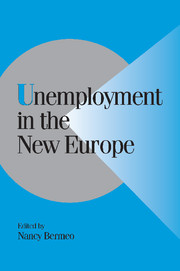Book contents
- Frontmatter
- Contents
- List of Contributors
- INTRODUCTION
- Part I Macroeconomic Contexts and Models
- 1 UNEMPLOYMENT, JOB CREATION, AND ECONOMIC AND MONETARY UNION
- 2 ORGANIZED MARKET ECONOMIES AND UNEMPLOYMENT IN EUROPE: IS IT FINALLY TIME TO ACCEPT LIBERAL ORTHODOXY?
- 3 GLOBALIZATION, WELFARE STATES, AND EMPLOYMENT: IS THERE A EUROPEAN “THIRD WAY”?
- Part II Unemployment and Domestic Bargaining Institutions: Challenging Some Myths
- Part III Unemployment and Domestic Bargaining Institutions: Three Cases
- Part IV Unemployment, Voting, and Political Behavior
- Index
2 - ORGANIZED MARKET ECONOMIES AND UNEMPLOYMENT IN EUROPE: IS IT FINALLY TIME TO ACCEPT LIBERAL ORTHODOXY?
Published online by Cambridge University Press: 26 March 2010
- Frontmatter
- Contents
- List of Contributors
- INTRODUCTION
- Part I Macroeconomic Contexts and Models
- 1 UNEMPLOYMENT, JOB CREATION, AND ECONOMIC AND MONETARY UNION
- 2 ORGANIZED MARKET ECONOMIES AND UNEMPLOYMENT IN EUROPE: IS IT FINALLY TIME TO ACCEPT LIBERAL ORTHODOXY?
- 3 GLOBALIZATION, WELFARE STATES, AND EMPLOYMENT: IS THERE A EUROPEAN “THIRD WAY”?
- Part II Unemployment and Domestic Bargaining Institutions: Challenging Some Myths
- Part III Unemployment and Domestic Bargaining Institutions: Three Cases
- Part IV Unemployment, Voting, and Political Behavior
- Index
Summary
An old specter is haunting Europe: the specter of liberal orthodoxy. I refer to the view that the only way for a nation to secure high levels of economic growth and employment is to develop an economy built around perfectly competitive markets, an ideal type that implies weak trade unions, substantially deregulated financial markets, and interfirm relations based on highly competitive relationships mediated by legal contracts rather than long-term collaborative arrangements. Of course, this is an Anglo-American orthodoxy, developed since the eighteenth century by British and American economists, whose ideals have been implemented most extensively and with great success in the economies of the United States and the United Kingdom.
Whenever the continental European economies have experienced economic problems, the Anglo-American model has been urged on them as a solution. It inspired much of the advice they received about postwar reconstruction and was revived again during the 1970s to indicate how Europe should respond to “stagflation” (OECD 1977; Olson 1982; Ruggie 1982; Keohane 1984; Milward 1984). Its policy prescriptions call for the deregulation of markets in labor and capital, retrenchment in social policy, and reductions in the state's role in the economy.
However, such prescriptions pose serious dilemmas for most European nations. Many have powerful trade union movements that resist efforts to deregulate labor markets (Calmfors and Driffill 1988). European value systems reflected in the strength of Social Democratic and Christian Democratic parties are inimical to the allocation of resources entirely by competitive markets (Esping-Andersen 1990; Polanyi 1944; Van Kersbergen 1995). Many European firms have developed strategies whose effectiveness depends on the nonmarket coordination that high levels of regulation make possible (Soskice 1991, 1994b).
- Type
- Chapter
- Information
- Unemployment in the New Europe , pp. 52 - 86Publisher: Cambridge University PressPrint publication year: 2001
- 10
- Cited by



